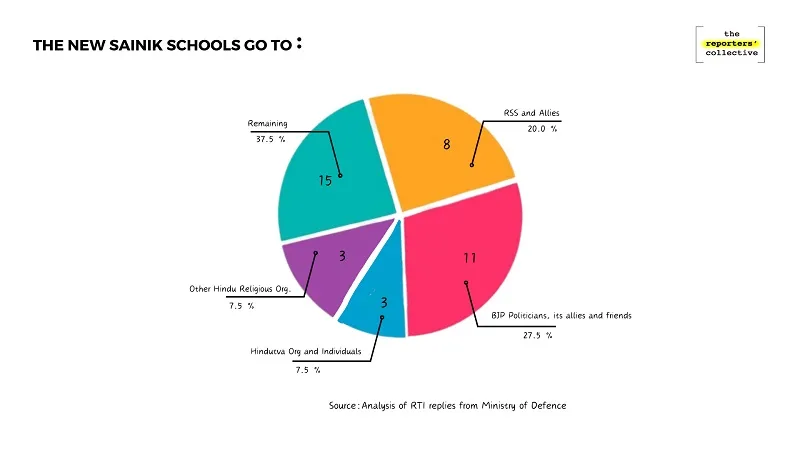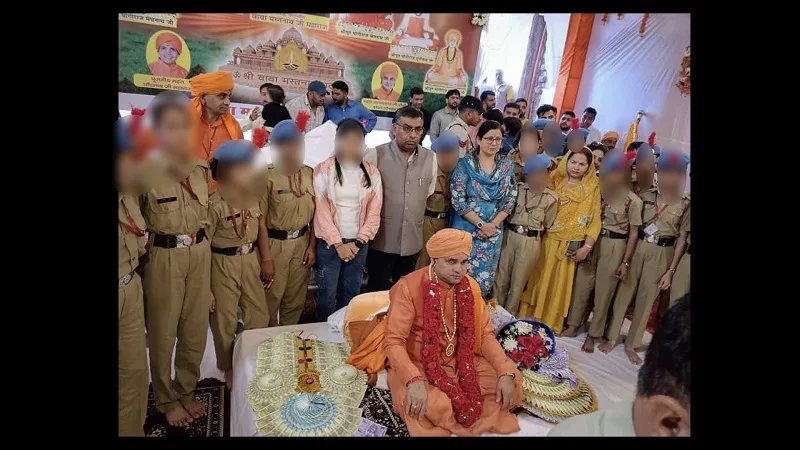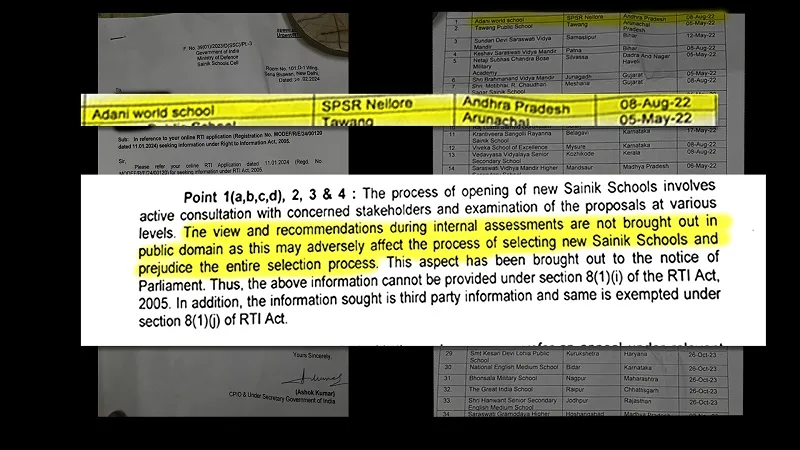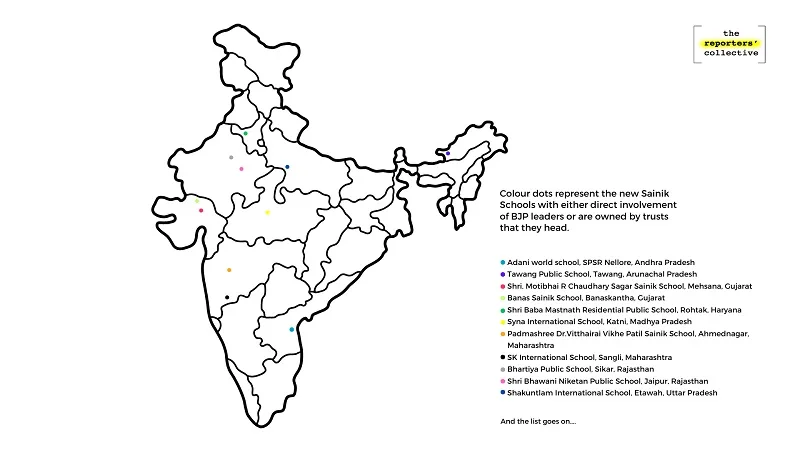- Sainik Schools, run under the Defence Ministry’s guidance, send cadets to India’s armed forces. The new initiative however relies on ideologically slanted organisations to train future cadets
By Astha Savyasachi
NEW DELHI, India: In one of the holy cities in India, Vrindavan, Hindu nationalist ideologue Sadhvi Ritambhara runs a school for girls, Samvid Gurukulam Girls Sainik School. Founder of Durga Vahini, Vishwa Hindu Parishad’s (VHP) women’s wing, she was a key figure in the Ram temple movement.
During one of the school events in June last year, the 60-year-old saffron-clad woman gets on the stage to address the students about ‘honour’, traditions and rituals during a personality development camp. In a video, shared on the school’s Facebook page, Ritambhara can be seen commenting on how girls are “out of control” in colleges and social media.
“What do we find in colleges? Girls smoking cigarettes at midnight. In these hubs of education, women are breaking liquor bottles, and spreading indecency with their boyfriends on motorcycles… We had never thought that the daughters of India would be so out of control. They are posting abusive reels on social media. They are doing nude photoshoots. They are showing off their bodies in undergarments. It seems that these women are mentally sick… These girls don’t have sanskar,” says Ritambhara.
Her girls’ school in Vrindavan and another, Raj Luxmi Samvid Gurukulam in Solan, Himachal Pradesh recently joined the list of at least 40 schools that have signed a Memorandum of Agreement (MoA) with the Sainik Schools Society (SSS), an autonomous body under the Ministry of Defence (MoD), to run Sainik Schools under Public-Private Partnership (PPP) model.
In 2021, the Union government opened doors for private players to run Sainik Schools in India. In their annual budget that year, the government announced plans to set up 100 new Sainik Schools across India.
Any school having SSS specified infrastructure – land, physical and IT infrastructure, financial resources, staff etc – could potentially be approved as one of the new Sainik Schools. As per the approval policy document, infrastructure was the only specified criterion that made a school eligible for approval. This limitation enabled schools linked with the Sangh Parivar and organisations with similar ideologies to apply.
Collated information from the Union government’s press releases and Right to Information (RTI) replies show a concerning trend. Our findings reveal that of the 40 Sainik School agreements so far, at least 62% were awarded to schools linked to Rashtriya Swayamsevak Sangh (RSS) and its allied organisations, politicians of Bharatiya Janata Party (BJP), its political allies and friends, Hindutva organisations, individuals, and other Hindu religious organisations.
While the government expects the new PPP model to bolster the recruitment pool for the armed forces, the initiative that brings in political players and right-wing institutions into the military ecosystem has raised concerns.
In the history of the Sainik School education system, this was the first time the government allowed private players to get affiliated with the SSS, receive “part financial support” and run their branches. On October 12, 2021, Prime Minister Narendra Modi led a cabinet meeting that approved a proposal to run the schools “as an exclusive vertical which will be distinct and different from existing Sainik Schools of MoD.”
According to the policy document, the government provides, through SSS, “an Annual Fee Support of 50% of fee (subject to an upper limit of Rs.40000/- per annum for 50% of the class strength (subject to an upper limit of 50 students) per year from Class 6 onwards till class 12, on Merit-cum-Means basis,” which means, for a school that has classes till 12th standard, SSS offers to provide support of maximum Rs 1.2 crore per annum. This is given as partial financial support to the students. Other incentives offered to the schools include “an amount of Rs.10 lakhs as training grant given annually based on academic performance of the students in class 12.”
Despite the government support and incentivisation, The Reporters’ Collective found that the annual fee for the senior secondary ranges from a nominal Rs 13,800 a year to as high as Rs 2,47,900, indicating a significant disparity across fee structures of the new Sainik Schools.
Who will run the new Sainik Schools?
Until the new policy, 33 Sainik Schools housing 16,000 cadets existed in the country with SSS acting as its parent body. SSS is an autonomous organisation under the Defence Ministry. Multiple government reports point to the importance of Sainik Schools in sending cadets to defence institutions. The Standing Committees on Defence have often emphasised Sainik Schools’ role in preparing cadets for the National Defence Academy (NDA) and Indian Naval Academy. In one of the most sought-after military entrance exams to join NDA, according to the 2013-14 Standing Committee, nearly 20% of Sainik School students appearing every year for the exam make the cut. According to data submitted in Rajya Sabha earlier this year, over 11 percent of Sainik School cadets joined the armed forces in the last six years. Defence Minister Rajnath Singh credits Sainik Schools for contributing more than 7,000 officers to the armed forces.
Sainik Schools, along with Royal Indian Military College and the Royal Indian Military Schools, send more than 25-30 percent of the cadets to various training academies of the Indian armed forces.
“In principle, the PPP model is a good idea. But my apprehension is about the kind of organisations which will win these contracts. If the majority of the ownership is in the hands of BJP-related individuals/organisations, then that bias will impact the nature of education imparted. If, like regular Sainik Schools, these students also have to apply for NDA and other entrance exams for armed forces, the kind of education they have received will definitely impact the outlook of the armed forces,” said a retired Major General who didn’t want to be named.
According to the RTI responses, at least 40 schools have signed MoAs with the Sainik Schools Society between May 05, 2022 and December 27, 2023. A closer review by The Collective reveals that out of the 40 schools, 11 are directly owned by BJP politicians or managed by trusts chaired by them, or belong to friends and political allies of the BJP. Eight are managed by RSS and its allied organisations directly. Additionally, six schools have close ties to Hindutva organisations or far-right rabble-rousers, and other Hindu religious organisations. None of the approved schools are run by Christian or Muslim organisations or any of the religious minorities of India.

Sanctioned for party members and friends
From Gujarat to Arunachal Pradesh, a large number of these new Sainik Schools either see direct involvement of BJP leaders or are owned by trusts that they head.
Tawang Public School in Arunachal’s border town of Tawang is the sole Sainik School approved in the state. The school is owned by the state chief minister Pema Khandu. Hitendra Tripathi, Ex. Officio Secretary of the school managing committee, who also serves as the school principal, confirmed Khandu’s role as chairman of the school committee. Khandu’s brother Tsering Tashi, a BJP MLA from Tawang, is the managing director of the school.
When asked if the government has favoured their school because of their BJP links, Tripathi said, “I don’t find any truth in that claim because three thorough inspections were carried out by the concerned authorities.” Tashi and Khandu, however, have not responded to our queries.
In Mehsana, Gujarat, Shri Motibhai R. Chaudhary Sagar Sainik School is affiliated with Dudhsagar Dairy, which is chaired by Ashokkumar Bhavsangbhai Chaudhari, a former BJP general secretary for Mehsana. Last year, Home Minister Amit Shah had virtually laid the foundation stone of the school. Another school in Gujarat, Banas Sainik School in Banaskantha, is managed by the Galbabhai Nanjibhai Patel Charitable Trust under Banas Dairy. The organisation is led by BJP MLA from Tharad and the current speaker of the Gujarat Legislative Assembly, Shankar Chaudhary.
In Uttar Pradesh, Shakuntlam International School in Etawah is run by Munna Smriti Sansthan, a non-profit chaired by BJP MLA Sarita Bhadauria. Her son, Ashish Bhadauria, who oversees the functioning of the school said, “We don’t have any experience in running Sainik Schools. We will be starting it from the coming session.” He claimed, “The selection process was very extensive.” When asked whether their application was favoured for party association, he said, “You should ask this from the government.”
The investigation found many of the people benefiting from this new PPP model include several BJP politicians. This long list has BJP leaders from different states.
In Haryana, Shri Baba Mastnath Residential Public School of Rohtak is now a Sainik school. Former BJP MP Mahant Chandnath founded it and is currently run by his successor Mahant Balaknath Yogi, the incumbent BJP MLA from Tijara in Rajasthan.

Some of the above-mentioned schools are existing schools which have received approval to become Sainik schools. Sainik schools, like many other government-run schools in the country, primarily follow the Central Board of Secondary Education curriculum with a few additional subjects, such as moral values, patriotism, communal harmony, and personality development, among others.
A school run by a foundation under the Adani Group, which is close to BJP, was also given affiliation.
Adani World School, in Nellore district, Andhra Pradesh, was also affiliated. The school is located near the Krishnapatnam port, a deep-water port operated by the Adani Group on the eastern coast. The school is owned by the Adani Community Empowerment Foundation. Priti Adani, chairperson of the foundation hasn’t replied to our queries.

Saffronising Sainik Schools
The list of approvals didn’t just include BJP leaders, the mandate to run private Sainik Schools was handed out to RSS institutions and several Hindu right-wing groups linked with it. Vidya Bharati Akhil Bharatiya Shiksha Sansthan (Vidya Bharati) is the educational wing of RSS. Seven such affiliations went to already existing Vidya Bharati schools across India — three of them are located in Bihar, and one each in Madhya Pradesh, Punjab, Kerala, and Dadra and Nagar Haveli. Bhausahab Bhuskute Smriti Lok Nyas, an affiliate of Rashtriya Sewa Bharti, the social service wing of RSS, is also part of the cohort running the schools. Their school in Hosangabad, Saraswati Gramoday Higher Secondary School, received approval.
Often accused of rewriting history, indoctrination and anti-Muslim curriculum, Vidya Bharati is upfront about how they define their mission. RSS established Vidya Bharati in 1978 to administer the growing number of schools under it. At present it has 12,065 formal schools under it, with 3,158,658 students, making it probably one of the largest network of private schools in India. They, as mentioned on their website, want to “build a younger generation which is committed to Hindutva and infused with patriotic fervour.”

The new policy changes have raised concerns involving ideologically skewed private players running Sainik Schools. “It is obvious, ‘catch them young’ is the concept. Not good for the armed forces,” said former Lt General Prakash Menon, agreeing that awarding contracts to such organisations will impact the character and ethos of the armed forces. Menon is currently the director of the Strategic Studies Programme at The Takshashila Institution.
In an article, Menon highlighted the potential danger “of a nexus developing between the Union and the private parties to promote an ideologically slanted version of education that is far removed from the values enshrined in the Constitution.”
Aditya Mukherjee, coauthor of the book RSS, School Texts and the Murder of Mahatma Gandhi: The Hindu Communal Project, found it shocking that such schools received sponsorship and official support from the Defence Ministry. “In a democracy, Vidya Bharati kind of schools shouldn’t even exist because of the hatred they have been spreading against minorities. But at least they were only RSS schools. By affiliating them to national institutions, particularly defence, the government is bringing unspeakable danger to the country. This is bound to infect the defence forces with a majoritarian, communal outlook,” Mukherjee told The Collective.
In an interview with The Collective, Avneesh Bhatnagar, general secretary of Vidya Bharati central executive committee, said, “We don’t manage these applications centrally. Each school applies on an individual level. The school committee would know if they were favoured. I cannot answer that.”
However, D. Ramkrishan Rao, president of Vidya Bharati central executive committee, talked about plans to apply for more such affiliations, “For now, we just tried with a few schools. But we are planning on getting more Vidya Bharati schools to apply and get affiliated to SSS, said Rao.
Bhonsala Military School, Nagpur, run by the Central Hindu Military Education Society, was also approved to be run as a Sainik School. The school was established in 1937 by Hindu right-wing ideologue B.S. Moonje. During the probes into the 2006 Nanded Bomb Blast and 2008 Malegaon blasts, the Maharashtra Anti-Terror Squad investigated the Bhonsala Military School where the blast accused were reportedly trained.
Just like BMS, several other Hindu religious trusts, some of them founded by Hindutva rabble-rousers, have received approvals to run Sainik Schools in their existing set-up. This includes Hindutva leader Sadhvi Ritambhara’s two schools mentioned above.
Infamous for her speeches leading to the demolition of Babri Masjid in December 1992, historian Tanika Sarkar described Ritambhara and her speeches as “the single most powerful instrument for whipping up anti-Muslim violence.” The Liberhan Commission which probed the Babri Masjid demolition in Ayodhya, accused 68 people including Ritambhara of leading the country “to the brink of communal discord.”
She remains significant within the Sangh Parivar and close to several BJP leaders. Union Home Minister Amit Shah travelled to Vrindavan in December 2023 to wish her on her birthday. In January, Defence Minister Rajnath Singh inaugurated an all-girls Samvid Gurukulam Girls Sainik School. During the ceremony, Singh commended Ritambhara for her pivotal role in the Ram temple movement. “Didi Ma [Ritambhara] made a significant contribution during the Ram temple movement. She has considered society as her family,” Singh was quoted by the news agency Press Trust of India.
Smt. Kesari Devi Lohia Jairam Public School in Kurukshetra, Haryana is owned by the National Vice President of Bharat Sadhu Samaj (BSS), a society of Hindu ascetics. Shri. Brahmanand Vidya Mandir Gujarat’s Junagadh, which too got the Sainik School affiliation, is run by Bhagvatinandji Education Trust, whose managing trustee — Muktanand ‘Bapu’ — has also been the President of Bharat Sadhu Samaj (BSS) since 2019.
Sree Sarada Vidyalaya, Ernakulam, Kerala is run by a Hindu religious organisation Adi Sankara Trust, a unit of Sringeri Sharada Peetham — a Sanatan Hindu mutt — believed to be set up by 8th century Hindu philosopher and scholar Adi Shankara.
The Collective sent detailed queries to the Defence Ministry and the Sainik Schools Society. We are yet to receive a response from either despite reminders. Requests to arrange a meeting with the founder of Param Shakti Peeth, Sadhvi Ritambhara and its general secretary, Sanjay Gupta, also went unanswered.
The above story was originally published by The Reporters’ Collective on April 03, 2024.
